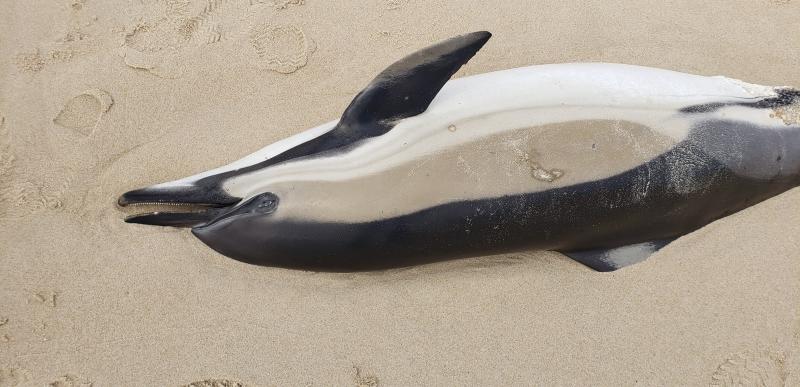Personnel at the Marine Education Research and Rehabilitation Institute were quite busy over the weekend, wrapping up an equally busy month
On March 2, the group responded to a 3.5-foot yearling harp seal that was on the shores in Dewey Beach. The seal remained on the beach throughout the weekend, with volunteers standing guard, informing the public and helping all keep the required 150-foot distance from the animal.
After consulting with NOAA, MERR determined that best treatment was to hydrate the seal, as she was observed to be slightly underweight. The seal was taken to MERR veterinarian Dr. Diane Holm, who named the seal Haven. Along with the staff at the Haven Lake Animal Hospital and the MERR response team, Dr. Holm provided hydration therapy to the seal, and she was released on a quiet beach Monday afternoon with hopes of her returning to the water.
“The seal did very well with its hydration procedures,” said Suzanne Thurman, executive director of the MERR Institute. “We are hoping she will be healthy enough to return to the water on her own.”
Also March, 2, volunteers responded to a previously monitored yearling harp seal on Conquest Road. The seal was originally tagged in New Jersey and first appeared Feb. 26, but went back into the water the following day. It again appeared on Key Box Road Feb. 28. “We were orchestrating a potential rescue, but it went back into the water,” Thurman said. The same seal stranded again March 2, and was deceased with evidence of a large shark bite wound. Responders brough the seal back to the MERR facility for necropsy at a later date to determine any additional contributing causes.
On March 3, MERR responded to a deceased adult common dolphin in Dewey Beach, but no obvious cause of death could be determined at the initial observation.
“We have responded to 43 stranding calls since the end of January,” Thurman said. “We are seeing higher than usual numbers.” She added that she and MERR are appreciative of the calls they receive from the public to report strandings, and for the cooperation from the public while monitoring them. “We are very thankful to everyone for helping to keep a safe distance from the seal, and for cooperating with the volunteers when they explain this requirement.”
According to requirements from the National Oceanic and Atmospheric Administration under the Marine Mammal Protection Act, people must maintain a minimum of 150 feet from a resting or stranded marine mammal. Approaching a seal could frighten the animal, or incite it to bite if they feel threatened. Additionally, seals are mammals and have the potential to transmit disease to humans and pets, so it is important to keep dogs on a leash at all times near these animals.
“It is natural behavior for a seal to come out of the water to rest, and doesn’t necessarily mean that the seal is ill or injured,” Thurman said. “MERR will conduct an assessment to make the best determination of the seal’s condition, and whether it needs veterinary intervention.”
To report a stranding, call 302-228-5029.
The Marine Education, Research and Rehabilitation Institute Inc. is a 501c3 non-profit stranding response and rehabilitation organization dedicated to the conservation of marine mammals and sea turtles. It is MERR's commitment to contribute to the preservation of these species through research and rescue efforts, and to foster greater understanding and appreciation of these species and their habitat through education and enhanced public awareness. MERR Institute is authorized by National Marine Fisheries Service and the State of Delaware to be the official stranding respondents for the marine mammals and sea turtles of Delaware.























































